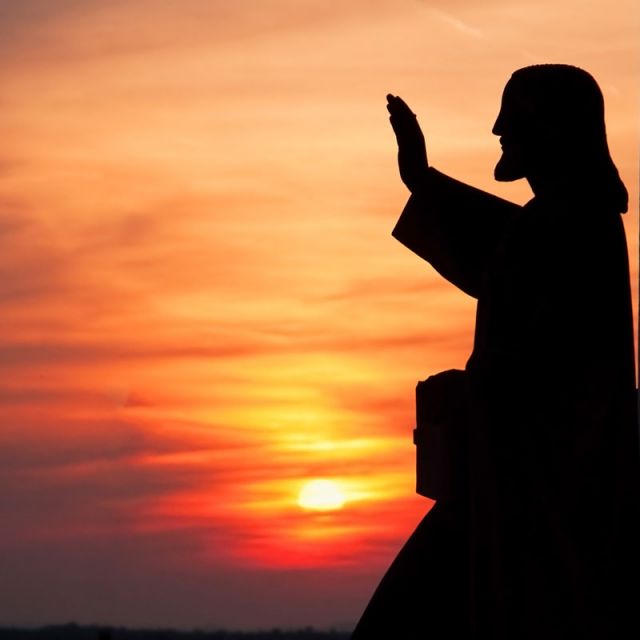The great mystery of a vocation
The first question in the Compendium of the Catechism of the Catholic Church is: “Which plan has God for man?” The first part of the answer is: “God infinitely perfect and blessed in himself, in a plan of sheer goodness freely created man to make him share in his own blessed life.” The wonderful vocation of every person is expressed here in a few words. God is overflowing love. The Father loves the Son and the Son the Father and the bond of Love which unites them is the Holy Spirit. God has created man out of pure goodness and in perfect freedom, so that he may participate in this blessed life. To all men which He calls into life He wants to give His unending love.
Much in our lives is the same for every person. We can think of the body with its members and organs and of the existence of man with soul and mind. Everybody has will and mind, he has feelings and the faculty of memory. Next to these realities which are common to all people, there are also notable differences: the traits of character of people are very different as well as gifts, talents and faculties, physical fitness and strength. Also in the religious make-up of people there are differences. In his letter to the Ephesians Paul writes: “Each one of us, however, has been given his own share of grace, given as Christ allotted it.” (Eph 4,7). The measure of grace which God gives is diverse; as are the tasks in the Church or the way in which the individual lives in Christ.

God chooses man
When we read the gospels, we see, that many people come to Jesus. They hear His message and are impressed by His words, they ask questions, and some of them are willing to change their lives. Jesus responds to the needs of people, He heals the sick, raises the dead and shares table with many people, even with those who are at the fringe of society because of their social status or because of their sinful lives. From some He demands to leave everything behind, to remain with Him and to share their whole lives with him. It becomes clear: the ways of God with men are diverse.
Behind the call of Jesus Christ to a relationship with Him of intimate friendship and love and to a specific task lies an election by God, His heavenly Father. This is an inexplicable mystery. God does not render account as to why He leads individuals in a particular way.
Young people sometimes ask themselves: Why does Christ call me and not others? Would not others be better equipped? There are parents who realise that one of their children has greater love for prayer and religious matters although all children have received the same education and the same example. Sometimes young people are drawn to God although they come from a family background where the faith is not practised. Some people are astonished if young people who would have the capacity to pursue a career or to earn much money, leave everything behind and enter a convent. Some of them even think, that those young people have been talked into this, that they are seized by a dangerous enthusiasm or by religious obsession. How God leads people depends only on His choice.
Jesus Christ came in this word to fulfill the will of the Father and to accomplish His work. Already in the Old Covenant there were people who were specially chosen and called: Abraham, Moses, David, the prophets etc. This divine call to a path which is not the path of the masses, continues in the New Covenant. Although it was commonly the case that young men presented themselves to a Rabbi to go into his school, Jesus acted differently. He does not wait for candidates. The gospel even tells us, that Jesus sent someone home who had wanted to stay with Him (cf. Lk 8:38f.) Jesus goes directly up to those He wants to choose and calls them: “Come, follow me!” (Mt 9:9). He does not give reasons for his call. He does not make an offer and adds: If you like it, you can come with me. The evangelist Mark recounts concerning the vocation of the twelve apostles: “And he appointed twelve; they were to be his companions and to be sent out to preach.” (Mk 3:14) Jesus calls those whom He wants to have and whom He knows to be chosen by the Father.
My joy is God, the threefold Holy One.
My joy is His life that draws me to Himself.
My joy is His will calling me.
My joy is His strength that guides me.
My joy is His heart in which I dwell.
Mother Julia

The second aim of Christ’s call is to be sent by God and to be in His service. The special vocation into the service of the Lord is on one side very personal and demands of the person their entire freedom and life. It implies a life of deep union with Christ. On the other hand it is a calling in the service of people. God wants to save the whole of humanity, as we read in the Bible, especially in the New Testament, again and again. There is a great harvest. Many people are far from God, they do not know him, they live far from him, in ignorance, in the dissatisfaction of a purely worldly life, in guilt and in sin. God does not interest them nor do they fear him. But God is interested in them and wants their happiness and the fulfilment of their lives. The Lord needs apostles to gather in this great harvest. He needs people who make the growth of the Kingdom of God their sole concern. Every baptised person has to contribute to the great harvest. Parents have to educate their children in the Faith, young people and adults have to give an inviting and powerful witness to the Faith. Nevertheless there are various degrees of commitment. God asks of some, and those are not so few, that they make the growth of faith in other people the essential content of their lives. Therefore they are willing to sacrifice the foundation of a family and other beautiful tasks and dedicate themselves entirely to Him. This happens in the service of a priest or missionary, in education, in the hidden, but very precious life of prayer and love in the enclosed contemplative life, in the service of the poorest of the poor and in many other ways of consecration to God.
The election and vocation of those who are chosen by the Father and called by the Son consists in a gift and a task. The gift of the vocation is an intimate union of love with Him, the task is to give oneself completely for the building up of the Church. Here we can draw a parallel to marriage. Married couples love each other and their love becomes fruitful in their children. Baptised persons who have received a special calling love the Lord intensely and make this love fruitful in the apostolic life and in the awakening of a new life of faith in their spiritual sons and daughters.
However, God does not communicate his election so clearly that one cannot say ‘no’ or have doubts. His way is to give us signs and indications, to allow experiences which form us and which make us make search and struggle. But He gives to everyone as many signs as he needs. He guides everyone in their own way. Accounts of vocation are very exciting and touching stories, sometimes they are humorous, sometimes very ordinary, sometimes extraordinary, but always moving. They are stories which show the manifold ways in which God deals with his people.